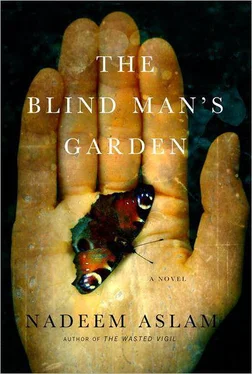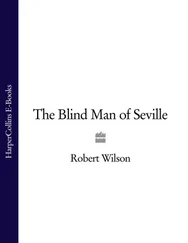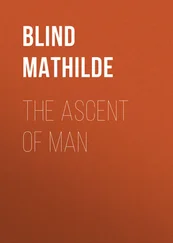She enters the hall, catching Basie’s eye on the far side. The children and the teachers are asleep, and she leans against a pillar and closes her eyes.
‘Dance,’ the man says, the man with the hood over his head. ‘Dance for me,’ he approaches and places his crazed hands on her shoulders. ‘Like the girls do in the films.’
She takes a step away from him and glances towards where she last saw Basie. But Basie now sits with his foot on the pedal detonator of the bomb. The terrorist had asked him to take his position before coming towards her.
When the hooded man tries to touch her again she sees Basie and some of the teachers look up from their exhausted half-sleep. Basie knows he must keep his foot on the pedal, must accept another insult for the sake of going on living, for the sake of others. There must be a place where it doesn’t happen like this , she thinks as the hooded man pulls her into the triangular space between two cupboards. She is thirsty. Basie is standing up, his foot still pressed on the pedal, his face full of confusion and distress, wanting to come forward but unable to. She calls out to him for help without realising. The hooded figure stops and looks in the direction she has shouted and she knows that by uttering his name she has ended his life as effectively as any bullet.
*
Ahmed sits in the library with his bright knife in his hands. A cold stone has replaced his mind. He has just spoken to Kyra on the phone. The building is to be raided.
Kyra also said that Basie’s car is parked in the alleyway on the side of the school. That he must be among the teachers.
He turns and looks towards the door, all receptors working again. There is a sound of feet running in his direction, and the head of Mecca House comes in, out of breath. Less than a minute earlier Ahmed had sent him to question the teachers one by one, to bring him Basie. Now he comes in and says,
‘We have Father Mede. He has just walked up to one of the small side doors and is knocking. He says he wants the children released in exchange for himself.’
‘Don’t open the door. It’s probably a deception. They are getting ready to storm the school.’ Ahmed walks to the head of the stairs and stops suddenly because two of his men are climbing the steps towards him with the white man between them.
And just then, from the corner of his eye, he sees the soldiers pouring in over the boundary wall.
Naheed is carrying a thick book towards the kitchen, the banana leaves crowding the windows. 2 a.m. The house is dark and silent and it is raining and she is unable to sleep. Now and then a flash of lightning makes her think the light from the moon is briefly at her feet.
It is night, and the female relatives of the adults and children who died when the soldiers stormed St Joseph’s must be visiting their graves in secret, carrying umbrellas against the possibility of rain, lamps against the darkness. Her memories of the end are still fragmentary. The terrorists had forced women and children to stand on chairs in front of the windows, to stop the soldiers from shooting into the school from outside. She remembers the fires burning in various places, the escaping hostages shot because they were mistaken for terrorists, an explosion sending the head of an angel through the smoke and flames into the garden. Molten plastic dripping from the burning roof. The sound of a helicopter. Being brought out of her daze by a sharp pain in her scalp, realising that it was a teenager in his death throes unknowingly pulling her hair. At one point she had somehow found herself beside a soldier and, in a daze of his own, he had reached out for the edge of her veil to wipe the blood from his gun. And later she saw some other men wiping their weapons on the soft leaves of the fig tree. Outside there were not enough government vehicles and the wounded were being loaded into private vehicles, the blood-covered limbs hanging out of car boots. And a few hours later, when it was over, the bodies of some of the terrorists were shown to the television cameras, their faces mutilated beyond recognition.
*
She opens the large book on the table, the breath from the page tilting the candle flame. The book is a dictionary of dates and moves through the history of mankind, from the very beginning to the present.
According to the Islamic calendar, it is currently the early fifteenth century. The 1420s. She wonders what was occurring in Christian lands in the early fifteenth century of the Christian era.
1426. The Venetians go to war with Milan. The Duke of Bedford returns to England from France, to mediate in a clash between his brother Gloucester and the Bishop of Winchester .
1427. The Emperor Yeshaq of Ethiopia sends envoys to Aragon in an attempt to form an alliance against the Muslims. The Duke of Bedford resumes the war in France .
1428. The University of Florence begins teaching Greek and Latin literature. Venetian troops under Carmagnola conquer Bergamo and Brescia. The Treaty of Delft ends the conflict between Flanders and England …
When lightning flashes across the pages she looks up, then continues to read. She doesn’t know who these personalities are, is unsure about most of the places too, but they do form a picture of their times in her mind.
… John Wycliffe’s bones are dug up by order of the Council of Constance, burned and thrown into the River Swift.
Faith, the uncorrupted kind, and also souls hooked darkly to the corrupted kind. All the ways of error and glory.
1429. Joan of Arc, a seventeen-year-old shepherdess from Lorraine, has visions. She persuades an officer to provide her with armour and is taken to the Dauphin and liberates Orleans in May .
Naheed turns back to the previous page, to see if things had been better ten years previously. The book tells her that in 1419 an event known as the Defenestration of Prague had occurred, when the followers of the executed Jan Hus had marched on Prague Town Hall to insist on the release of imprisoned preachers. They force their way into the Town Hall and throw Catholic councillors out of the upper windows. John the Fearless is murdered following a turbulent meeting with the Dauphin …
And what of the future? Were things better in Christendom ten years on from 1429? Would things be better for Pakistan and Islam in a decade?
1437. The Portuguese are defeated at Tangier by the Moors. The Moors extract a promise from the Portuguese to return to Ceuta; the King’s brother Fernando offers himself as hostage but the Portuguese fail to return and Fernando is abandoned in the dungeons at Fez. James I of Scotland is stabbed to death by Sir Robert Graham, whom the king had banished. Graham is tortured and executed …
She leans forward and blows out the candle, and it is as though she has just breathed out darkness through her mouth, enough to fill up the room. Assaulted by answers, she walks away from the book, out into the lightning.
‘So you have returned,’ the policeman says to Naheed.
He sips his tea, looking over the rim at her and then at Tara.
‘Yes,’ Tara says. ‘She had gone to visit some relatives.’
He had appeared at the house half an hour ago, a two-foot length of bamboo cane under his left arm.
The man puts the cup on the table. ‘We have to take you to the police station and ask a few questions,’ he tells Naheed. ‘Put on your shoes and veil.’ He lifts the cane from his lap and touches his earlobe with the tip of it.
‘What kind of questions?’ Tara says. ‘There is no more to tell.’
The man’s gaze is firmly on her face. ‘What did you say your name was? What does your husband do?’
Читать дальше












